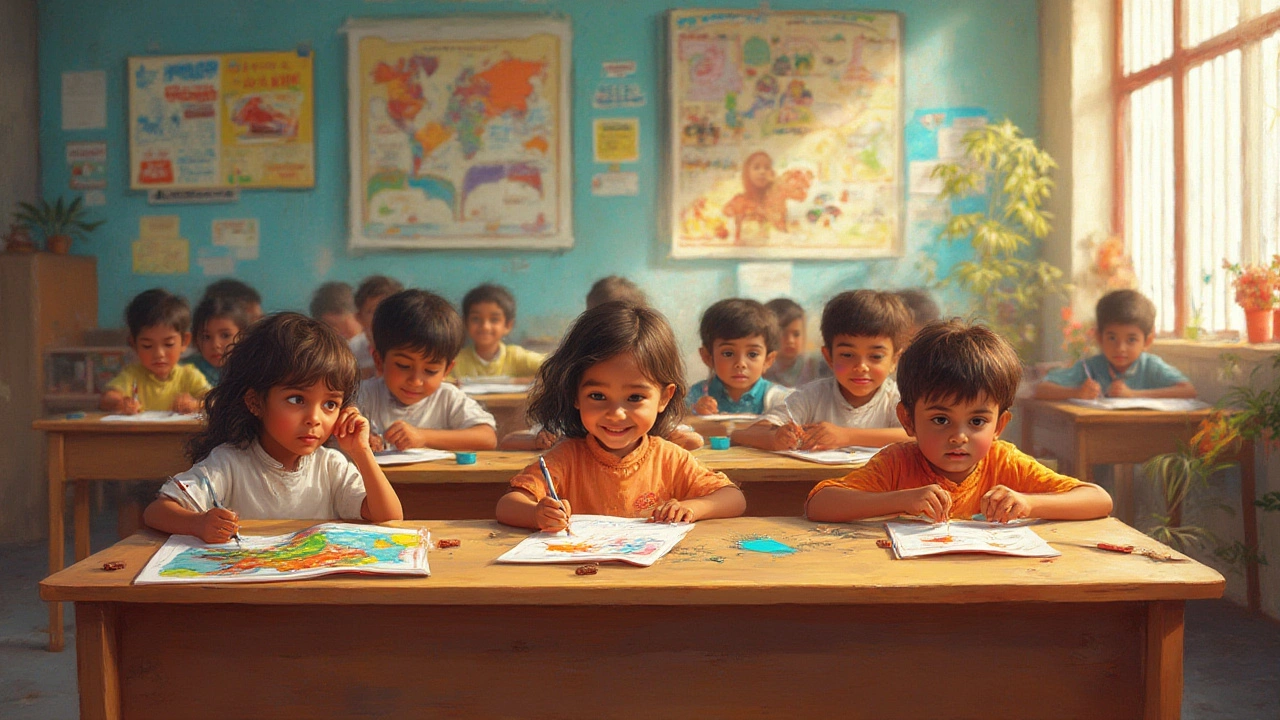Imagine being at a crossroads where your next step could impact pretty much every branch of your life – from the college you get into, to the skills you pick up, to the way you see problems and solve them. Picking a school board isn't just an admin checkbox; it can shape your mindset, readiness for the future, and how smooth (or bumpy) your academic journey is going to be. Parents lose sleep over it for good reason. Everyone has a story about someone who switched boards, aced life, or struggled to catch up. With global universities and job skills changing faster than phone software, it's not just about scores anymore. It’s about flexibility, practical skills, and a real hunger to learn. Every board – CBSE, ICSE, IB, IGCSE, and State Boards – claims it has your child’s future in mind. The catch is, their idea of "future" is wildly different. If you want your decision to pay off five or ten years from now, you’ve got to look deeper. Buckle up, because the rabbit hole goes way beyond textbooks and exams.
How Do Boards Stack Up: Teaching Styles, Assessments, and Real-World Readiness
The first big difference comes from how each board treats learning. CBSE, the Central Board of Secondary Education, is literally everywhere in India and abroad. It teams up closely with competitive exams like JEE and NEET – so if your kid dreams of engineering or medicine in India, best board for future often means CBSE. The board is known for its science-focused approach, neat syllabus, and, honestly, a decent tolerance if you need to switch schools in different cities.
But if you’ve actually seen a CBSE classroom, you’d notice much of the teaching revolves around set syllabi, direct Q&A, less project work, and not much room for skills outside the book. Sure, they offer optional subjects and co-curricular involvement, but the rigor can feel mechanical. It’s good for tough exam prep, but may not excite budding artists or hands-on learners.
ICSE (Indian Certificate of Secondary Education) by CISCE is a bit like CBSE’s artsy cousin. The syllabus is recognised internationally for its emphasis on English, literature, and a more holistic approach. Expect more lengthy texts, essays, and a sharper focus on projects and classwork. If your kid writes well, asks “why” a lot, and wants a wide base in humanities, ICSE lays out a bigger playground. The board's assessments are detailed, and students often end up with pretty polished language and analytical skills by the end of Grade 12. Students from ICSE tend to have a relatively smoother time with foreign university applications, thanks to the board’s orientation towards global courses. That said, ICSE can be dense and stressful for kids (and parents!) if your focus is simply on scoring high marks.
Then there’s the international buzzword: IB, or International Baccalaureate. The IB program is like a passport for global universities; it puts the spotlight on self-learning, teamwork, and a mountain of projects. The curriculum is flexible, even letting students mix subjects across streams until the very end. Assessments aren’t just about exams but research, discussions, and personal projects too. Honestly, IB is fantastic if your child is independent, wants to question everything, and can handle continuous work without relying on last-minute exam cramming. IB is the closest you get in India to a truly international classroom experience. Students in IB often outperform others in creative writing, critical thinking, and problem solving—but it can be overwhelming for kids not used to constant assessments. Also, not every Indian university recognizes the IB school-leaving certificate, so you’ll need to double-check eligibility if domestic colleges are the goal.
IGCSE, short for International General Certificate of Secondary Education, is controlled by Cambridge Assessment (UK-based) and is essentially the international version of secondary education. Many international schools in India offer IGCSE for Grades 9 and 10, followed by ‘A Levels’ or IB for 11 and 12. The strength lies in the emphasis on practicals, options to choose from 70 subjects, and real-world context in lessons. Assessment includes coursework and a mix of written exams, making it much broader than rote learning. IGCSE is great for students eyeing colleges abroad – especially the UK, Australia, or Singapore.
State Boards (think Maharashtra, Tamil Nadu, Karnataka, etc.) are run by state governments, and their biggest argument is local relevance and affordability. The curriculum is generally lighter, and textbooks are less expensive. There’s a tilt towards the regional language, more inclusion of local culture and history. For students planning to study and work locally, state boards offer that connection. The flip side? State curricula can be outdated or less challenging, and it can get tough if a student switches states.
Here’s a breakdown of syllabus style and university acceptance in a nutshell:
| Board | Curriculum Focus | College Acceptance (India/Abroad) | Flexibility |
|---|---|---|---|
| CBSE | NCERT, STEM, competitive-exam friendly | High in India, moderate abroad | Medium: wide school network, less subject choice |
| ICSE | Languages, analytical skills, projects | High in India, high abroad | Medium: detailed, wider syllabus |
| IB | Interdisciplinary, global, projects | High abroad, moderate in India | Very high: flexible combinations, coursework-heavy |
| IGCSE | International, practical, diverse | High abroad, moderate in India | High: subject selection, varied assessment |
| State Boards | Regional relevance, affordable | High in state, low abroad | Low: syllabus varies by state |
So, what’s the actual day in the life for these schools? If your kid loves worksheets, solving past years’ questions, and likes a friendly competition among millions, CBSE’s rhythm might keep them motivated. For kids who enjoy presenting, essay writing, case studies, and balanced exposure, ICSE does a better job. IB is for the rebels who love asking questions, prefer working on projects over memorizing, and don’t mind group work. IGCSE students spend more time in labs, experiments, and genuine discussions. In State Boards, the atmosphere is more relaxed, but resources and exposure may be limited—unless you land in the top-rated government schools. At the end of the day, it’s not which board looks best on paper but which one makes your kid actually want to learn that matters.

Career Impacts: How Boards Lay the Road for Jobs, Skills, and Higher Studies
Let’s get brutally honest—choosing a board isn’t just about right now, it’s about where it sends you later. A ton of students from CBSE and ICSE go on to ace India’s toughest entrance exams because their syllabus lines up almost exactly with JEE (engineering) and NEET (medicine). If that’s the goal, these boards give the best head start. Several reports, like the annual data from the National Testing Agency, show over 80% of top ranks in NEET/JEE come from these two boards. But if the plan is to head overseas, international boards could knock down more doors.
IB Diploma Programme (DP) students regularly score admission offers from Ivy Leagues, Oxford, and global tech giants. According to the 2023 IB Global Data Report, nearly 80% of IB Diploma holders worldwide secure a university spot of their choice, and those who want to study in the US, UK, or Europe fare especially well. IGCSE students add up a pretty strong CV for UK-style ‘A Levels,’ which is a favorite pathway for top UK and Singaporean schools.
But skills go beyond just admissions. Want creative thinking? IB and ICSE will stretch students with essays, debates, and a heavy dose of creativity. Looking for practical know-how and the confidence to run science or business projects? IB and IGCSE win again. Hoping for deep knowledge and discipline? CBSE’s vast question banks and time-tested textbooks build the habit. ICSE students get a reputation for strong English, which comes in handy in jobs or exams abroad.
Here’s something people rarely mention: many tech companies and startups look for candidates who show creative solutions and teamwork, not just memory recall. Kids from IB and IGCSE backgrounds often find it easier to adapt to college-level research and collaborative work, while State Board and CBSE toppers might need an adjustment period. On the other hand, Indian government or state-run colleges are laser-focused on board exam percentage, where CBSE or State Board may make applications simpler with less paperwork.
Let’s do a quick fact check by looking at the typical skills developed by each board:
| Board | Skill Focus | Fits Best For |
|---|---|---|
| CBSE | Logical reasoning, subject basics, test practice | Indian competitive exams, STEM careers |
| ICSE | Analytic writing, language skills, critical thinking | Humanities, creative fields, communications |
| IB | Inquiry, global citizenship, research | International universities, research jobs, leadership |
| IGCSE | Practical application, electives, collaboration | Foreign higher education, hands-on disciplines |
| State Boards | Concept basics (local relevance) | Regional colleges, cost-sensitive families |
Quick tip: Don’t just ask what board sounds best, but think about where your child will apply for college, their learning habits, and what excites them. For example, if your heart is set on IIT, a CBSE school with strong coaching will usually map out everything needed. For a child who wants to try out everything from robotics to drama and possibly shift countries for university, IB or IGCSE is a smart pick. If budget rules the roost or focus is on staying in a particular state, State Board stays sensible, but supplement with extracurricular opportunities.
Also, be wary of hype. It’s impressive to hear about IB and IGCSE toppers storming into global universities, but these boards are tough, expensive, and demand a lot of parental involvement. Some families switch when kids struggle with rote approaches, but international boards require consistent performance. Many parents admit they underestimated the time and money needed; tuition fees for ICSE, IB, and IGCSE schools are up to 3–5 times higher than most State Boards, and finding experienced tutors is trickier. If you pick one of these boards, be ready for the extra time and cash involved.
No board is a golden ticket. The best fit depends on individual strengths, career goals, and a support system that helps fill gaps. If you're worried your chosen board isn’t enough, invest in online learning or expansion projects to cover new skills. As of 2025, companies and colleges are shifting towards skills, not just exam results, hinting the board may soon matter less than how you use it.

Tips for Choosing the Right Board: Real Questions, Real Stories
It’s easy to overthink this decision, but you can cut through the noise by getting brutally specific. Are you planning to switch jobs, cities, or countries soon? That rules out some options. Does your child love a particular language, subject, or learning style? Not every board gives equal importance to art, sports, or coding. Is your kid comfortable with fast-paced competition, or do they like working at their own pace?
Start by checking where the schools near you stand. Are they accredited? Do they have experienced teachers—not just fancy facilities? Get testimonials from parents of senior students: how many alumni end up at their dream colleges, and how stressful is the journey? Many cities have forums and WhatsApp groups where parents swap survival stories about boards, school cultures, and hidden fees. Tap in.
Here’s a checklist to make comparisons easier:
- Future Plans: Plan to stay in India for college? CBSE and ICSE are safer bets. Aiming abroad? Try IB or IGCSE.
- Learning Style: Does your child love hands-on projects? Go for IB or IGCSE. Prefer structure? CBSE delivers. Want a strong English foundation? ICSE shines.
- Budget: International and private boards are more expensive. Factor in tuition, books, and coaching.
- Flexibility: If moving cities is likely, CBSE is the easiest to transfer. State boards are rarely portable.
- Exam Pressure: Some kids thrive on pressure; others thrive when given freedom.
- Extracurriculars: Check if the school, not just the board, offers what matters most: sports, STEM, arts, drama.
- Post-Grade 10/12 Choices: Some boards let you mix subjects; others fix streams (science/arts/commerce). IB and IGCSE are the most flexible.
Parents often find it helps to speak directly to students (not just teachers) from schools you’re considering. The honest feedback about day-to-day workload, pressure, bullying, and support is unbeatable. Try school open houses or alumni gatherings. Notice the atmosphere: are kids curious, relaxed, competitive, overworked? The culture matters as much as the board.
Also, remember that trends shift. For example, 10 years ago, hardly anyone considered IGCSE or IB. Now, demand for these boards is up by 20% annually according to data from Cambridge International and the IB Organisation. More Indian state boards are also introducing English-medium streams, and some have started modernizing their curriculum. It’s worth checking if your local state board has made recent syllabi updates.
One overlooked point: Some global universities now look for talent from diverse boards. They may also test students themselves (SAT, AP, etc.), making the board less decisive. A smart strategy is to supplement your child’s board with international certificates or project work—think coding bootcamps, Olympiads, Model United Nations, or creative portfolios.
If your child hasn’t found their passion yet, focus less on picking the “best” board, and more on the right environment to discover new skills. No one likes a mismatch; a motivated student in any board can outperform an uninterested one in the so-called “best” system. Stay flexible, ask tough questions about daily school life, graduation rates, and stress levels, and don’t hesitate to switch if something better comes along. Years from now, it won’t be the board’s name printed on medals or resumes—but the confidence, curiosity, and grit your child picked up along the way.

